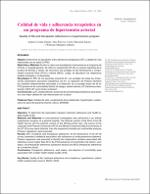| dc.contributor.author | Lozada Zapata, Andrea | |
| dc.contributor.author | Piscoya, Julio | |
| dc.contributor.author | Shiraishi-Zapata, Carlos | |
| dc.contributor.author | Mendieta Albañil, Wilfredo | |
| dc.date.accessioned | 2022-06-30T14:51:17Z | |
| dc.date.available | 2022-06-30T14:51:17Z | |
| dc.date.issued | 2020-11 | |
| dc.identifier.citation | Revista de Salud Pública. 2020; 22(6) | es_PE |
| dc.identifier.issn | 2539-3596 | |
| dc.identifier.uri | https://hdl.handle.net/20.500.12959/2385 | |
| dc.description.abstract | Objetivo Determinar la asociación entre adherencia terapéutica (AT) y calidad de vida relacionada con la salud (CVRS).
Materiales y Métodos Se llevó a cabo una investigación transversal en el programa de HTA de un hospital general. Se utilizó el cuestionario SF-36 y la versión española de la prueba de Morisky y Green. Se obtuvieron los puntajes de las dimensiones y componentes sumarios físico (PCS) y mental (MCS). Luego, se ejecutaron los respectivos análisis bivariante y multivariante.
Resultados El 39% de los pacientes presentó AT. Los puntajes de todas las dimensiones presentaron asociación estadística con AT. La regresión de Poisson identificó las variables independientes asociadas a la obtención de un puntaje mayor de 50 en PCS [presencia de comorbilidad (factor de riesgo), estado laboral y AT (factores protectores)] y MCS (AT como factor protector).
Conclusiones La AT, estado laboral y ausencia de comorbilidad presentaron asociación con una mejor calidad de vida relacionada con la salud. | es_PE |
| dc.description.abstract | Objective To determine the association between treatment adherence and health-related quality of life.
Methods and Materials A cross-sectional investigation was performed in an arterial hypertension program of a general hospital. The Spanish version of the Short Form-36 Health Survey and the Spanish version of the Morisky-Green test. The scores of the subscales and Physical Component (PCS) and Mental Component (MCS) summaries of the SF-36 survey were obtained, then the respective bivariate and multivariate analyzes (Poisson regression) were executed.
Results 39% of patients had therapeutic adherence. All the dimensions of the SF-36 survey presented a statistical association with adherence to antihypertensive treatment. Poisson regression was executed to identify the independent variables associated with obtaining a score higher than 50 in the PCS [presence of comorbidity (risk factor), work status, and therapeutic adherence (protective factor)] and MCS (therapeutic adherence as a protective factor).
Conclusions Therapeutic adherence, work status, and absence of comorbidity were associated with a better health-related quality of life. | es_PE |
| dc.format | application/pdf | es_PE |
| dc.language.iso | spa | es_PE |
| dc.publisher | Universidad Nacional de Colombia. Facultad de Medicina. Instituto de Salud Pública | es_PE |
| dc.relation.uri | https://revistas.unal.edu.co/index.php/revsaludpublica/article/view/88007 | es_PE |
| dc.rights | info:eu-repo/semantics/openAccess | es_PE |
| dc.rights.uri | https://creativecommons.org/licenses/by-nc-sa/4.0/ | es_PE |
| dc.subject | Calidad de vida | es_PE |
| dc.subject | Cumplimiento de la medicación | es_PE |
| dc.subject | Hipertensión | es_PE |
| dc.subject | Cuestionario de salud del paciente | es_PE |
| dc.subject | Quality of life | es_PE |
| dc.subject | Treatment adherence and compliance | es_PE |
| dc.subject | Hypertension | es_PE |
| dc.subject | Patient health questionnaire | es_PE |
| dc.title | Calidad de vida y adherencia terapéutica en un programa de hipertensión arterial | es_PE |
| dc.title.alternative | Quality of life and therapeutic adherence in a hypertension program | es_PE |
| dc.type | info:eu-repo/semantics/article | es_PE |
| dc.subject.ocde | https://purl.org/pe-repo/ocde/ford#3.02.04 | es_PE |
| dc.identifier.doi | https://doi.org/10.15446/rsap.v22n6.88007 | |






